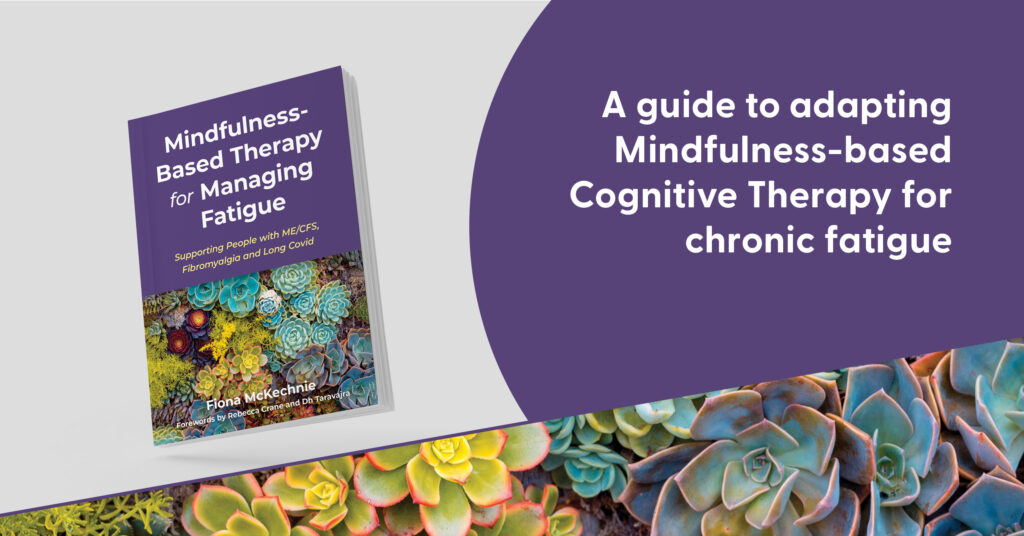Mindfulness does not cure ME/CFS, long covid or fibromyalgia
A mindfulness-based approach can support the self-management of a longer-term ME/CFS condition and helps people feel better.

The ME Association describes ME/CFS:
ME/CFS is recognised as a post-viral fatigue syndrome. It is a long-term, multi-system disease that can have a devastating impact on functional ability and quality of life.
No effective drug treatment has yet been developed, and full recovery is rare, but symptoms can stabilise and improve over time with careful management and support.
Coming to a diagnosis of ME/CFS, fibromyalgia or long covid is difficult as, so far, there are no biomedical markers or tests or clarity about the mechanisms of these conditions, so it is not possible to treat the underlying cause medically. After a lot of inconclusive investigations, people are often told they need to ‘learn to live with it’. The stark reality is that ninety percent of people in NHS ME/CFS and pain clinics struggle to work or go to school. I personally have a strong belief (and concern) that both mindfulness and self-management suggestions need to be aware of a ‘self-improvement agenda’ that puts all the work onto the person who is struggling. There needs to be a contextual approach that works with the social and economic situation – for example, if someone is struggling to hold on to a job and manage a family, then ‘self-management’, never mind meditation without explicitly addressing this, can make things harder. Addressing practical concerns (and empowering people to address them or support them by advocating for them) needs to be embedded in the approach. Specialist services (where they exist) support people by working out what pacing is needed and provide support with the emotional and practical challenges that can arise. Group sessions help put people in touch with each other so there is some peer support and an exchange of shared ideas.
A mindfulness-based approach came from conversations with patients who had been through the self-management programmes but were struggling with the reality of ‘living with it’. Several people told us they found mindfulness useful, so we instigated this approach personally and then worked with small groups of patients who were keen to try it out.
We trained with the MBCT and MBSR programmes as they were then published. After several years of running mindfulness groups, and some evaluation, the programme developed. We identified there was a particular nuance to the practices and adaptations to delivery. For example, there was a need to focus on using the potentially restful nature of mindfulness practice by learning to ‘stop’ or ‘pause’. This included emphasising the unwinding of tension in the body and developing a compassionate awareness. This has enabled people to experiment with changing their approach to activity and rest.
The information in the programme has been adapted to manage fatigue, and the sessions are structured to be accessible to a range of cognitive and physical abilities. The fluctuating nature of the conditions means needs can vary from session to session. This is reflected in a choice of length of practice; the design and content and choice of handout and the ways in which people can physically access the group.
Mindfulness programmes include gentle movement, the mindfulness for fatigue programme specifically includes gentle inquiring movement that has been developed by physiotherapists who specialise in fatigue and pain and have a lived experience of fatigue.
Acknowledging the fluctuating nature of the condition means considering how much activity is possible. Mindfulness provides a way for someone to acknowledge how they are, explore what is going on and investigate what might be required in this situation.
This inquiry is key to the approach but takes gentle practice and we recommend people have access to a therapist who understands the nuances of the condition to support them if it becomes overwhelming. By gently turning towards ME/CFS, other ways of being can emerge. Rhonda Knight lives with ME/CFS and describes this process in the book:
At the end of the programme, I was able to accept that a setback is likely to be part of the course, but I didn’t need to beat myself up about it. After all, I am living with a chronic condition and I plan to live as well as possible with it, rather than the continual daily fight, and to be mindful of my fatigue, pain, emotions and thoughts during this time. Another strategy was to plan to consider positive events that occurred each day during this time to balance my tendency to sink into the depths of despair.
Making mindful decisions was becoming more of a habit in my daily life as the questions I so frequently heard on the guided meditations often arose when I felt that I was struggling in a situation:
‘What do I need to do right now?’
‘How can I best look after myself right now?’
‘What does my body need now?’
Therapists wanting to use this approach are encouraged to learn the principles of activity management and mindfulness for themselves as they explore the awareness with people living with fatiguing health conditions.
Mindfulness-Based Therapy for Fatigue Supporting People with ME/CFS, Fibromyalgia and Long COVID is publishing on 21st September by Jessica Kingsley Publications.
The practices and other resources including audio and written materials are freely available here: http://fionamckechnie.com.
More information and resources will be added over time, including therapist/mindfulness teacher training in this approach. Please follow https://fionamckechnie.substack.com/ as the programme is shared in the wider world.